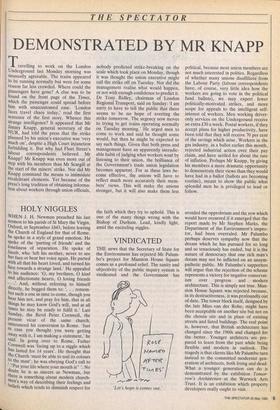THE SPECTATOR
DEMONSTRATED BY MR KNAPP
Travelling to work on the London Underground last Monday morning was unusually agreeable. The trains appeared to be running normally but were for some reason far less crowded. Where could the Passengers have gone? A clue was to be found on the front page of the Times, which the passenger could spread before him with unaccustomed ease. 'London faces travel chaos today,' read the first sentence of the first story. Whence this strange intelligence? It appeared that Mr Jimmy Knapp, general secretary of the NUR, had told the press that the strike planned by his union's executive was 'very much on', despite a High Court injunction forbidding it. But why had Fleet Street's labour correspondents believed Mr Knapp? Mr Knapp was even more out of step with his members than Mr Scargill at the start of the miners' strike. Nor did Mr Knapp command the means to intimidate recalcitrant elements. Yet because of the press's long tradition of obtaining informa- tion about workers through union officials,
nobody predicted strike-breaking on the scale which took place on Monday, though it was thought the union executive might call the strike off on Tuesday. Nor did the management realise what would happen, or not with enough confidence to predict it. Dr Tony Ridley, chairman of London Regional Transport, said on Sunday: 'I am sorry to have to tell the public that there seems to be no hope of averting the strike tomorrow. The urgency now moves to trying to get trains operating normally on Tuesday morning.' He urged men to come to work and said he thought some would, but then he might be expected to say such things. Given that both press and management have an apparently ineradic- able habit of judging what workers want by listening to their union, the brilliance of the Government's trade union legislation becomes apparent. For as these laws be- come effective, the unions will have to reflect much more accurately their mem- bers' views. This will make the unions stronger, but it will also make them less political, because most union members are not much interested in politics. Regardless of whether many unions disaffiliate from the Labour Party (labour correspondents have, of course, very little idea how the workers are going to vote in the political fund ballots), we may expect fewer politically-motivated strikes, and more scope for appeals to the intelligent self- interest of workers. Men working driver- only services on the Underground receive an extra £30 a week. Postal workers, if they accept plans for higher productivity, have been told that they will receive 70 per cent of the savings which arise. Workers in the gas industry, in a ballot earlier this month, rejected industrial action over their pay claim, and have settled for about the rate of inflation. Perhaps Mr Knapp, by giving his members a more dramatic opportunity to demonstrate their views than they would have had in a ballot (ballots are becoming routine), meant to show the public what splendid men he is privileged to lead or follow.


















































 Previous page
Previous page